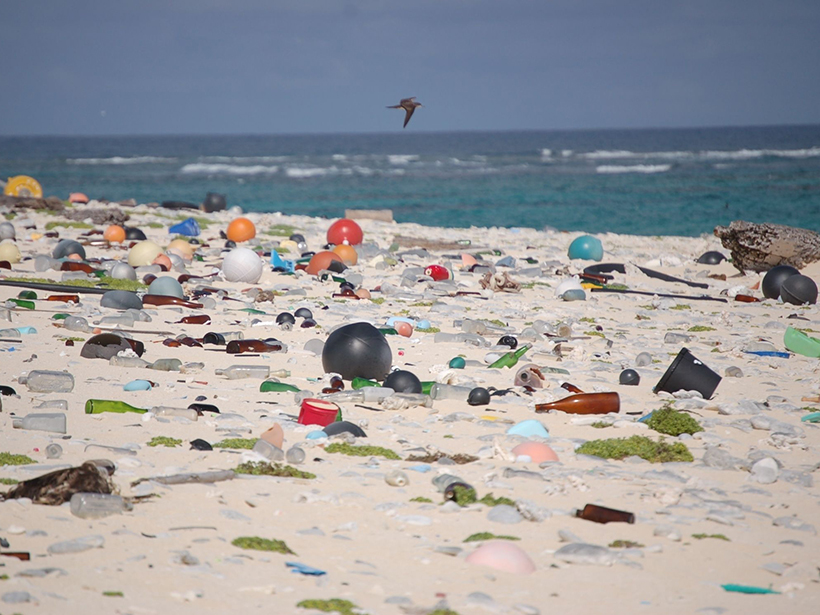Rep. Alan Lowenthal (D-N.Y.) waved his credit card during a briefing on Capitol Hill about plastics pollution. “Anybody want to volunteer to eat this thing?” he asked.
In addition to plastic fouling the oceans, littering the landscape, choking wildlife, and being incinerated, a recent study by Australia’s University of Newcastle found that people might be ingesting the equivalent of a credit card’s worth of plastic each week.
Plastic pollution “is not just simply an ecological crisis. This is a human health issue as well,” said Lowenthal, the lead sponsor of House legislation introduced on 11 February to limit pervasive plastic pollution and establish effective recycling programs.
With plastics production expected to triple by 2050 and with just 8% of plastic in the United States recycled, Lowenthal said that the Break Free from Plastic Pollution Act of 2020 “is the most comprehensive legislation ever introduced in Congress to tackle the plastic waste crisis.”
The bill requires plastics producers to take responsibility for designing, managing, and financing waste recycling programs; creates a 10-cent national refund program for all beverage containers; prohibits some single-use plastic products, including restaurant carryout items; and calls for an increasing amount of recycled content in plastic beverage containers.
In addition, the bill focuses on environmental justice issues by preventing the export of plastics to countries that cannot properly recycle it and by temporarily pausing the construction of new plastic production facilities.
A Tipping Point
“The plastic pollution crisis has reached a tipping point, and the American people are fed up.”
“The plastic pollution crisis has reached a tipping point, and the American people are fed up,” said Sen. Tom Udall (D-N.M.), who introduced companion legislation in the Senate. “It’s flooding our communities. It’s suffocating our waterways. It’s even invading our bodies.”
Udall said that plastic is an important component for products such as medical devices and lighter-weight cars. However, he said that the waste needs to be curbed.
“What’s more, plastic is a major contributor to climate change,” he said. “The entire plastic life cycle produces enormous quantities of greenhouse gases. By 2030, emissions [linked to] plastic will reach 1.3 billion metric tons, equal to 300 coal fired power plants.”
Udall said that the new legislation is much more far-reaching than earlier Save Our Seas 2.0 legislation to deal with ocean plastic pollution, which the Senate approved last year.
“Ours is the only bill in the Congress that deals with the source of the problem.”
The earlier bill “doesn’t put the responsibility on the [plastic] producers for the financial resources needed for the design and for the management of cleaning it up,” Lowenthal said.
“Ours is the only bill in Congress that deals with the source of the problem,” said Udall. “Other bills attempt to deal with our waste once it’s already in the environment or dedicate tax dollars to a recycling bill that will hardly make a dent in the issue.”
He added that “there is tremendous bipartisan support for tackling plastic pollution in Congress right now.”
However, it’s unclear whether that support applies to this bill, which currently lacks Republican cosponsors.
Pushback from the Plastics Industry
Tony Radoszewski, president and CEO of the Plastics Industry Association, said the bill has significant drawbacks.
“The title of this bill suggests it is more interested in garnering headlines than it is in finding solutions.”
“As drafted, we do not believe the Break Free from Plastic Pollution Act of 2020 would effectively address pollution in the U.S. or globally,” he said. “The title of this bill suggests it is more interested in garnering headlines than it is in finding solutions.”
Radoszewski said that plastics account for only 13% of municipal solid waste in the United States. He added that effort to specifically target plastic materials, which life cycle analyses might show are better for the environment than other materials, “would be misguided at best and harmful at worst.”
The Save Our Seas 2.0 Act and other bills provide better approaches than the current bill, Radoszewski said, adding that his association looks forward to educating lawmakers “about the benefits plastics provide and the environmental, economic, and medical dangers that would accompany ignoring those benefits.”
Udall said the new bill is bold “because the severity of this crisis demands it.” However, he said that the bill is also pragmatic. “Congress should take up this legislation now because each day without action is another day that plastic waste piles up more, poisoning our planet for eternity,” he said.
—Randy Showstack (@RandyShowstack), Staff Writer
Citation:
Showstack, R. (2020), Bill calls for dramatically cutting plastic pollution, Eos, 101, https://doi.org/10.1029/2020EO140084. Published on 11 February 2020.
Text © 2020. AGU. CC BY-NC-ND 3.0
Except where otherwise noted, images are subject to copyright. Any reuse without express permission from the copyright owner is prohibited.

